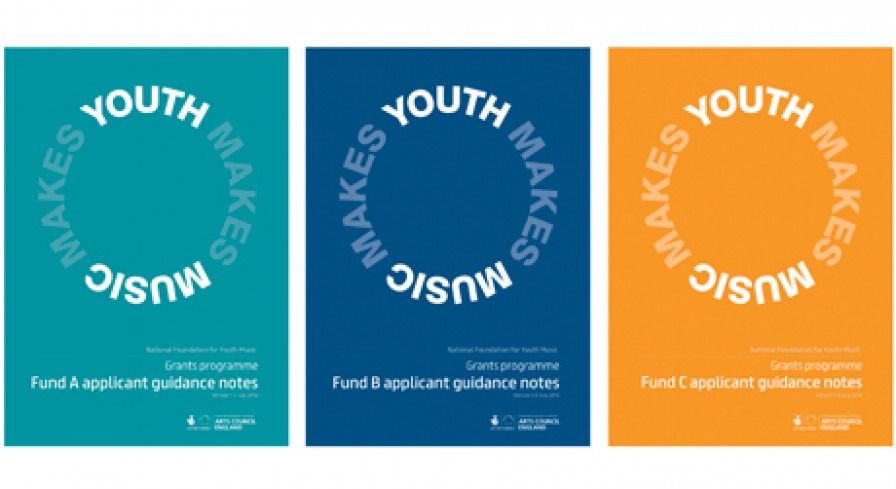Youth Music grants programme refresh - what's changed and why?

Over the last six months we have been working hard to evaluate our funding programme, following its launch in November 2011. We encourage all of our grantholders to be evidence-based and responsive, and we work with the same approach within our own organisation.
The data we have analysed to support the programme refresh includes our annual stakeholder survey, milestone and end-of-project evaluation reports submitted since the start of the new programme, the interim evaluation of our Musical Inclusion module, and consultations with grantholders. This was contextualised to the current environment in which we find ourselves - two years into the National Plan for Music Education, within a new partnership structure and in a more competitive funding environment.
What has changed
Our analysis told us that many of the things we are doing are effective – the range of work we fund, our flexible and constructive approach, the fact that the programme is outcomes-based, and the ‘fit’ of the work to the needs of children and young people and the sector.
For all the positive feedback we received about the programme, we also knew there were things we could improve – particularly around simplifying the programme and making it more accessible. This led to two of the main changes that you will see in the refresh: the introduction of a small grants fund, and the funding programme no longer being based on a modular structure. We have also made some changes to our criteria.
Small grants
We have introduced a small grants fund (Fund A) with a streamlined, shorter application process and four application deadlines per year. This was in direct response to suggestions made through our stakeholder survey, so that we can better support and nurture emerging organisations and provide fast access to funding to get projects off the ground more quickly.
Change to the modular structure
Despite no longer operating a modular structure, the focus of our programme has remained very similar and is now articulated through our new Outcomes Framework, which covers five outcome areas: musical, personal, social, organisational and workforce. Many organisations told us they liked our funding modules – their focus and bite-sized nature. However, over the last few rounds we have received (and funded) significantly more applications to our open module than any other. We found in reviewing your evaluation reports that grantholders delivering the open module were generally more adept at reporting against their outcomes and evidencing their successes. This suggested that people wanted more flexibility to develop their own outcomes, which led us to develop the new Outcomes Framework. Within this, we will prioritise work with children in challenging circumstances, support progression across all genres, and strive for high quality provision across all our funded projects. With the introduction of the new Outcomes Framework we are also bidding farewell to the generic outcomes, although we are now requiring applicants to embed our Quality Framework within their provision and to share learning via the Youth Music Network.
Criteria
There are now three different funds that organisations can choose – Fund A, Fund B and Fund C. Fund A offers small grants for high quality music-making projects and involves a simple application process. Fund B offers medium - sized grants for larger programmes of work and Fund C offers grants for strategic programmes to help embed sustainable, inclusive music-making across a geographical area. Alongside the introduction of these funds we have also decreased the number of funding agreements that organisations can hold with us at any one time. At the same time we’ve increased the length of time that projects can run for. These changes are intended to prevent organisations from spending their time and resources making multiple applications for new projects and then, if successful, reporting against them all separately.
We have also made some other changes to our programme criteria. Our recent experience with the Exchanging Notes module showed that there was an appetite and need for (non-curriculum) music in schools, so applicants are no longer restricted to the amount of provision they can offer during school hours (although we envisage that most of the work we will fund will continue to be outside of school hours). The other major change to our criteria is that we will now fund projects working with young people up to and including 25 years of age. Youth Music is a children and young people’s charity and we recognise that being young doesn’t stop at 19 – in fact, we know that young people face many challenges in their transition to adulthood, precisely at a time when many other support structures cease.
Further information
We’ve been doing all this (i.e. undertaking the programme evaluation and refresh) at the same time as being reviewed by Arts Council England in relation to our role and funding beyond March 2016. We’ll hear the outcome of the review in the Autumn, but in the meantime are continuing to work hard to ensure a vibrant youth music sector which helps those in the most challenging circumstances to progress in, and through, all types of music.
If you have any questions about the programme refresh then we recommend you consult our applicant guidance notes. We also have a page of FAQs and dedicated support via our Grants and Learning Team: telephone 020 7902 1060 or email grants@youthmusic.org.uk

